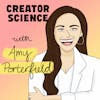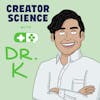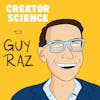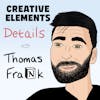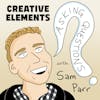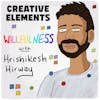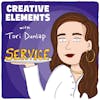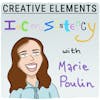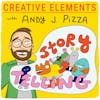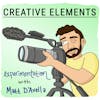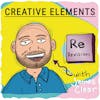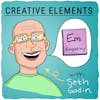
#59: Mignon Fogarty – Making the case for shorter podcasts with a Podcasting Hall of Famer and New York Times best-selling author
Play EpisodeMignon Fogarty is the founder of the Quick and Dirty Tips network and creator of Grammar Girl.
Mignon Fogarty is the founder of the Quick and Dirty Tips network and creator of Grammar Girl.
Grammar Girl has published more than 700 episodes since 2007. The podcast provides short, friendly tips to improve your writing and feed your love of the English language. It's one of eleven shows on the Quick and Dirty Tips network.
She is an inductee in the Podcasting Hall of Fame and a five-time winner of Best Education Podcast in the Podcast Awards.
In this episode, we talk about the growth of Grammar Girl and the Quick and Dirty Tips Network, trends in podcasting, book publishing, and how her obsession with Learning has steered her creative career.
Enroll in Podcast Like The Pros
Visit Mignon Fogarty's website
Subscribe to the Grammar Girl Podcast
Subscribe to Grammar Girl on YouTube
Learn more about The Quick and Dirty Tips Network
Full transcript and show notes
***
LISTENER SUPPORT
Join our community on Facebook
Support this show through Buy Me A Coffee.
***
SPONSORS
Try Podia and save 15% for life as a Creative Elements listener
Start your free trial of SavvyCal and get your first month free using promo code ELEMENTS
Get a free month of Blinkist Premium
Try Grammarly for free and save 20% on Grammarly Premium
***
ABOUT JAY CLOUSE
Subscribe to my weekly newsletter
Follow Jay Clouse on Instagram
Enroll in my course on podcasting, Podcast Like The Pros
***
PODGLOMERATE NETWORK
This show is a part of the Podglomerate network, a company that produces, distributes, and monetizes podcasts. We encourage you to visit the website and sign up for our newsletter for more information about our shows, launches, and events. For more information on how The Podglomerate treats data, please see our Privacy Policy.
Since you're listening to Creative Elements, we'd like to suggest you also try other Podglomerate shows surrounding entrepreneurship, business, and careers like Rocketship.fm and Freelance to Founder.
Learn more about your ad choices. Visit megaphone.fm/adchoices
Mignon Fogarty 0:00
I think now more than ever, it's, it's helpful to be part of a network, you know, it's become harder to launch a new show. I mean, you definitely still can. But it really helps to have other shows that can help you with your launch to promote it to mention it to give you some juice on social media, things like that.
Jay Clouse 0:18
Well, welcome to Creative Elements, a show where we talk to your favorite creators and learn what it takes to make a living from your art and creativity. I'm your host, Jay Clouse. Let's start the show.
Hello, welcome back to another episode of Creative Elements. Longtime listeners of the show, know that I have a bit of a bias towards the mediums that I know the best and care about the most. And that is writing and podcasting. And that makes today's episode pretty special because it's a combination of the two. Today I'm speaking with one of the most successful and longest running podcasters out there, Mignon Fogarty also known as Grammar Girl, but long before Mignon was known to the audio world as Grammar Girl, she was a professional writer.
Mignon Fogarty 1:19
While I was a technical writer and editor, I have an undergraduate degree in English but a Masters in Biology. So I was editing, you know, white papers for biotech companies. And I wrote a lot of the Stanford Cancer Center website and things like that I worked at a bunch of internet startups that were health related. So I was a writer and an editor in the technology field.
Jay Clouse 1:40
Then around 2006, Mignon became interested in podcasts, some of the earliest podcasts were in the science and technology fields. And that seemed like a good place for her to start her own show.
Mignon Fogarty 1:50
I had a science podcast, I actually did something called Absolute Science for almost eight months before I started Grammar Girl. So that was an interview-based show and a news based show with a co host. And gosh, it took a lot of time. So I was working as a freelance writer and editor and when you're doing that time really is money. So I realized I couldn't do that anymore. It didn't make sense. But I had come to love podcasting. So I was looking for a shorter, quicker, quick and dirty podcast that I could do. And I realized you know, I was looking at writing roles all the time and my client, editing clients were making the same mistakes over and over again. So I was looking to do a simpler show and I landed on Grammar Girl.
Jay Clouse 2:36
And that decision really paid off. Grammar Girl provides short friendly tips to improve your writing and feed your love of the English language. We're talking about episodes that are less than 15 minutes here sometimes less than 10. Mignon tackles specific topics like when to use the different forms of their, there and they're. Weather blonde should have an E at the end, and where to place punctuation when there are parentheses involved.
Mignon Fogarty 3:01
If the part inside the parentheses is a question, put the question mark inside. But if the parentheses just come at the end of a longer question, put the question mark outside. For example, if you write this sentence, we're going to Lori's beach house open parenthesis, where is the beach house again? Close parenthesis. So you've put the question, where's the beach house again, inside parentheses as part of one long sentence? So you put the question mark inside the closing parenthesis. Where is the beach house again, question mark, closed parenthesis, and then a period to end the whole sentence.
Jay Clouse 3:39
Mignon started Grammar Girl in 2007 and it was a near instant success.
Mignon Fogarty 3:45
You know, I posted my show to Apple podcast back then iTunes and within six weeks it was number two I was like This American Life Grammar Girl.
Jay Clouse 3:54
Really?
Mignon Fogarty 3:55
Yeah. And it was I was all just word of mouth. I didn't do anything to promote it. But then when it did so well writers started to notice and then I started to get a lot of press which was great.
Jay Clouse 4:07
A lot has happened for Mignon over the last 15 years and 700 plus episodes of Grammar Girl. The show is a five time winner of the best education podcast from Podcast Awards and Mignon is an inductee in the Podcasting Hall of Fame. She has written seven books including the New York Times bestseller, Grammar Girl's Quick and Dirty Tips for Better Writing, and she has developed an iOS game called Grammar Pop. She even appeared on The Oprah Winfrey Show. Oh and Grammar Girl is only one of Mignon's podcasts. Shortly after launching the show, Mignon created one of the first podcast networks The Quick and Dirty Tips network to launch other short form educational shows too. So in this episode, we talk about the growth of Grammar Girl and the Quick and Dirty Tips Network, trends in podcasting, book publishing, and how her obsession with learning has steered her creative career, I'd love to hear your thoughts on this episode. As you listen, you can find me on Twitter or Instagram @JayClouse. And if you haven't joined our Creative Elements, listeners group on Facebook yet, the link is in the show notes. But now, let's talk to Mignon.
Mignon Fogarty 5:20
I've always had a knack for making complicated things interesting. So that, you know, when I was in college and doing science work, you know, my professors would comment on that, though, you know, you have such a skill for writing and making this interesting. And I feel like I do the same thing with grammar. Like that could be very dry and boring too. But I just try really hard to make it fun and interesting. And there's always a story that goes with things that can help. But you're right, when I was writing user manuals for DNA sequencers, you know, my soul wanted to die. I, I was feeling very unhappy with my career, even though I was, you know, I was very successful, but I just was bored out of my mind, and that was part of the reason I started podcasting is, you know, to have a hobby to have something, you know, more interesting to do with my, my brain. So, yeah, that was also what got me started.
Jay Clouse 6:16
It's hard to put yourself back into the mindset of like, 2006, 2007. But for the listener, you know, this is when Twitter was getting started. It was when Uber was getting started. So imagine like before Twitter, and Uber and all the social media and things and you were starting a podcast. I don't think I listed my first podcast until 2015, maybe.
Mignon Fogarty 6:34
Oh wow.
Jay Clouse 6:35
So tell me about the world of podcasting when you're getting started and how you identified this as a medium that was even open and available to you, and one that you were interested in?
Mignon Fogarty 6:43
Oh, it was this wonderful, small, friendly world. I listened to podcasts before I started making one. And so I was a fan. And gosh, you know, I kept telling my dad about this amazing thing called podcasting that I had discovered. And finally, he's like, why don't you just go ahead and do it? You, you know, you talk about it, you love it, just just actually do it. So so I had that encouragement. And the thing that people find hilarious now is that I thought I was too late. I thought I had missed the way. Because I started podcasting after Apple launched their podcasting section. You know, that was a big growth time. Before that, it was technically really quite hard to get a podcast and then Apple came along, and it was much, much easier. And there was an explosion in the number of podcasts. And I felt like I was really way too late.
Jay Clouse 7:33
So what podcasts were you listening to before you started yours? And Hhw are you actually listening to them?
Mignon Fogarty 7:39
Yeah, so I was listening on a mp3 player, I actually don't remember how I got them. I listened to a show called Maths Today in History, which was a big inspiration for me, because it's a similar format. It was a short, scripted show. And I really liked that. I also listened to I think it was called this week in science back then, with Dr. Kiki, she and her co host I don't remember his name now. But they were out of UC Davis doing a science show that I really enjoyed. I think it might have been a radio show that was rebroadcast as a podcast. And honestly, I don't remember any of the others I listened to it was so long ago, but those were two big ones. I was just so inspired and you know, saw other people doing it. And I have always loved technology. And I love I love learning new things. So figuring out the ins and outs of podcasting, especially back when it was really hard was was you know, candy to me, it was just fun to learn, you know how to hand code and RSS feed and you know, get up podcast up in the world. It was it's my it's my jam.
Jay Clouse 8:41
You had to write your own RSS feed and beginning even when Apple podcast is allowing you to listen in that way?
Mignon Fogarty 8:47
Oh, yeah. And I insisted on doing it by hand for a long time after you didn't have to. And I remember Rob Wall from Lipson would make fun of me, because I wouldn't like to switch over to the automated way of doing it.
Jay Clouse 8:59
Oh my gosh. Well, just out of curiosity, I'd love to hear what your audio setup was in the early days. What were you using to actually record?
Mignon Fogarty 9:06
Oh, gosh, well, I think my first real mic was a snowball, and that that mic served me well for so long. I'm really clumsy. So I dropped it probably 10 times and it still works. You know, the other thing that got me started is I hurt my wrists. And so I was doing voice dictation. Around the time I became interested in podcasting. So I just had a little cheap, you know, headset from Radio Shack or something, but it had gotten me used to talking into a microphone. And it was the same time when I started discovered podcasting. So I think the intersection of those two things also helped to get me started because I felt comfortable talking into a microphone. And so my first mic was just you know, some horribly cheap, you know, $20 thing in the sound terrible. I went back and remastered those original episodes eventually.
Jay Clouse 9:55
You mentioned that some of the first shows you're listening to were short, scripted. shows maybe even radio shows that were adapted and rebroadcast as a podcast in those early days. Was that typical that people were putting scripting into their production work? Or what what was the level of production like?
Mignon Fogarty 10:12
No, it was quite unusual. I didn't really enjoy long cat shows. And that was the majority of what was out there. And a lot of it was science and technology, because it was the big nerds who were interested in podcasting in the beginning. And, you know, I didn't enjoy those shows, as much as I enjoyed Math Today in History, because I felt like it got to the point, it didn't waste my time. And I just really liked that. And I felt it just fit more with what I wanted to do. And then production wise, it's actually easier to do one person talking with the script, you know, I don't have to go back and do much editing. And I don't have to schedule and coordinate with anyone else. So the time saving element was also really one of the reasons I did it.
Jay Clouse 10:52
Well take me back this moment where I think you said your father said, Why don't you go ahead and make the show? How did you settle on the format for Grammar Girl?
Mignon Fogarty 11:02
So that when he said go ahead and do the show, that was when I started the science show. And I did it with a co host. And we did interviews, which was really hard back then with scientists. And we did news commentary every day. And and that was taking me about 20 hours a week. So the format I chose because I was looking to do something that would take less time, actually, you know, is what I liked. I liked the history show. And then I was also looking to just do something a lot simpler because I wanted to keep podcasting, but I couldn't commit that much time to it. So what's really funny about that is after I did Grammar Girl, then it took off and took so much more of my time that it became my full time job. So it was didn't go as planned, but it went well.
Jay Clouse 11:43
Is the format from the early days pretty similar to what it is today?
Mignon Fogarty 11:47
It is it was much much shorter back then. So you know, Quick and Dirty Tips is the network. And that's that's something my mom would say, let's do a quick and dirty job on these dishes. Or let's do a quick and dirty job pulling these weeds and it means just the essentials, like let's do just what needs to be done. And so that was my goal is to give people just the advice they need on how to use the semicolon, you know, for example, Grammar Girl here, today's topic is semi colons, I get questions about semicolons a lot, so it's time to clear up some confusion. semi colons separate things. Most commonly, they separate two main clauses that are closely related to each other, but that could stand on their own as sentences if you wanted them to. Here's an example. It was below zero semi colon squiggly wondered if he would freeze to death. The two parts of that long sentence that are separated by a semicolon could be sentences on their own. If you put a period between them, it was below zero period squiggly wondered if he would freeze to death period. One reason you might choose to use a semi colon instead of a period is if you wanted to add variety to your sentence structure. For example, if you thought you had too many short choppy sentences in a row, but when you use a semicolon, the main clauses should be closely related to each other. You wouldn't write it was below zero, semi colon squiggly had pizza for dinner, because those two main clauses have nothing to do with each other. And back then I show would be maybe a minute and a half, two minutes. Over time I found I have more to say. And now I have two or three segments per show. So now the show is more in the 12 to 17 minute range when you add everything up all the segments and the callers and things like that. So it's much longer than it used to be.
Jay Clouse 13:37
What's wild to me, my next question was going to be you know, how do you come up with the ideas for what you're going to share in this episode. And what's wild to me is, you're now 700 plus episodes in and now you're doing more segments per show as if you you just don't have enough even inventory to share all the ideas you have related to the English language.
Mignon Fogarty 13:55
Right. And a couple years ago, I did two shows a week for I think it was a whole year. And I sometimes don't wish I was doing that because I have so much I want to cover when things things come up in the news. And I'll be like, Oh, I already did this week show I can't fit this in. But it is a mix. Because you know, a lot of the topics do get more esoteric, you know, we're coming up on 15 years. And instead of doing just the basics that people know they want like effect versus effect and who versus whom I'm talking about. Did you know that the word op ed actually doesn't mean opinion editorial but opposite editorial because the page appears opposite the editorial page in a newspaper.
Jay Clouse 14:33
I did not know that.
Mignon Fogarty 14:34
Yeah, so I I fit in a lot more like isn't this word fascinating? Isn't this word origin interesting kind of segments to go along with the purely educational stuff, mostly just because that's the kind of thing that interests me these days. And people seem to like it too, when I do it. So nobody's complained that I'm not completely useful in every single segment. I think people like to be entertained to say It seems to be working.
Jay Clouse 15:02
After a quick break Mignon and I talk about how she generates new ideas week after week, and how she manages her production process. And a little bit later, we talked about the future of the podcasting space. So stick around, and we'll be right back. Welcome back to my conversation with Grammar Girl, Mignon Fogarty. After publishing more than 700 episodes of Grammar Girl over the last 15 years, I figured Mignon has probably learned a pretty efficient process for producing her own show. So we asked her how she manages that level of content production.
Mignon Fogarty 15:36
I have a monster spreadsheet that keeps track of everything I've ever done, separated by show and segment. But it is a challenge. The thing that's just in the last month or so that's become challenging is, you know, because we have so many segments, the website also does really well to the website is a big part of our business. And you know, it's been maybe 10 years since I updated the segment on how to write numbers. And to keep relevant in search rankings. I need to update that. But I don't want to be constantly doing reruns, I do a lot and I usually rework things. But you know, I do that a lot. But there are more things that need to be updated to work on the website, as opposed to the podcast. So I've had to add a new sheet to my spreadsheet to keep track of things I've updated only on the web, but not in the podcast, because I might want to do them in the podcast in the future someday. So having to bifurcate those dates has been a big challenge. So yeah, yeah, it's true content management is challenging.
Jay Clouse 16:39
We're gonna zoom the story for it here in a minute to talk about how this became your full time job and the hat that grew into a network and those things. But while we're here, I would love to hear kind of a beginning to end, what is your process look like for producing one of these episodes that people can understand what goes into creating a scripted show, even if it is a shorter show, I'm sure there are a lot of steps.
Mignon Fogarty 16:58
Sure. And and I should also say that to have fresh ideas, I now work with guest writers for, I don't know, 30% to 50% of the shows. And one thing I love about that is they bring fresh ideas that I you know, they have ideas I never had. So that is incredibly helpful. But let's just focus on when I write a show, you know, I come up with the idea. And then I'll just start researching, you know, and I use you know, I'm on the web, I used the Oxford English Dictionary at an online dictionary.com Merriam Webster Google Books, I use those a lot. And then I also have a library of physical books that I that will look things up and almost always, Garner's modern English usage, the Merriam Webster Dictionary of English usage, and then I have a whole bunch of more specialized books that I'll, I'll look at, depending on what the question is. And so I just want to start reading about it and learning everything I can about it. And sometimes it's as straightforward as I think it is going to be. And other times, it's, it's much more interesting, you know, last week I covered, what's the spelling of ketchup, you know, is it with the C or the K, and I thought that would be really short and straightforward. But then I discovered that ketchup wasn't always a tomato sauce. And the history of ketchup is fascinating. And so, you know, my husband jokes that I can always turn a tidbit into a medium middle, I call my, my short, short segments, tidbits in the long ones or medium middles. And he's like, turned into a meaty middle again, didn't it? I can do that. Yeah, so I do the research. And then I sit down and I write the script. And you know, that takes, you know, time depending on how complicated it is. I almost never abandon a topic. But sometimes I do this week, I actually had to abandon a topic, because I just felt like I couldn't explain it in a clear way. Yet, I just needed to do a lot more research. And that's very frustrating. And then almost never happens. So usually, I just sit down and write it. And then I have my script. And when I have time, I send it to my editor to review. I don't do that nearly as often as I should. I'm bad. I like being edited. I just can't get my stuff done on time. But then, then I record. And then I have a producer who helps with all the backend stuff. So I record and then I actually have a podcasting checklist because there are so many steps now and what I need to do, we have a partnership with Macmillan Learning. So they get an ad free version of the show with a triple proof read transcript that they use on their educational platform. So that requires a lot of extra side work. So they separate those two and I make their transcripts. And I make my web pages and have to pick the art I have to format everything put in the references and all that it takes a long time to make the pages actually write the metadata for our system, you know that title and description and all that I write social media posts for we have a social media person but I write most of the posts for her to schedule because you know with a grammar show they have to be perfect. Then I send it to my producer who runs it through filters, you know, to get rid of my pops and even allow it and stuff like that. And then he, he ultimately makes it go live. And then then I try to do social media the next day or two to promote it again, that's something I need to get better at. But I used to be much better at it.
Jay Clouse 20:17
It's very encouraging to me to hear that you are still so hands on. Because, you know, I my process is similar in a lot of ways. There's just so many steps. And it's like, oh, my gosh, I love when I get ahead. But I'm never more than like a week ahead on actual finished episodes, or the scripted part of it. And I still do my own social media, things like that, too. And it's just exhausting.
Mignon Fogarty 20:39
Same here. And I actually had to add, tell your producer, the file is ready to my checklist, because a couple times I uploaded it and forgot to tell him. every little step is on it. I really believe in checklists. So.
Jay Clouse 20:52
I wanted to go back to this point Mignon made a little bit ago about thinking she was too late to start a podcast back in 2007. It's funny in retrospect, because that was still such early, early days for the medium. So I asked Mignon to reflect on how the growth of podcasting generally has impacted Grammar Girl.
Mignon Fogarty 21:12
I feel like the the growth in the last 15 years, I don't feel like it's affected me that much like what I do is what I do. You know, in the early days, one thing that really helped me is that writers love the idea that a grammar podcast is popular. So I was the Wall Street Journal web pic of the day in think it was 2006, it might have been 2007. Yeah, after that I got calls from I think it was five New York publishers who wanted to do a book deal because it wasn't that long after it shoots and leaves have come out. So they're like, this is our next eats, shoots and leaves. And I was already looking for a partner. But at that point, I had launched the whole Quick and Dirty Tips network with and I had about six shows in the network. Because as I mentioned, I worked at startups in Silicon Valley. And so I knew when the show took off that I was on to a whole business, and I was looking for a partner to grow it even more. And so fortunately, Macmillan Publishing what had a big digital initiative. So they were looking to get into digital businesses and, and they called me about a book, but we ended up partnering over the whole network. So I did a book deal. But I also partnered with them for Quick and Dirty Tips. And I was very involved in the management for the first few years. And then in 2009, they took over most of the day to day management of the network, and they've done a great job.
Jay Clouse 22:32
That's incredible, for a few reasons. One being that you recognize that there's momentum here, and you're interested in growing that entry into a business, because that's not necessarily a natural leap for everybody out there. Not everybody is inclined or interested or aware enough to start a business. So you know, what was that like for you? Yes, you had the experience. But what was the push to say, you know, I do want to be an entrepreneur now.
Mignon Fogarty 22:58
I have always had entrepreneurial tendencies. So my college roommate, and I started a hairbow business out of our room, we made scrunchies. And we went around selling them on campus. So you know, from the very early days, I've always been interested in, I don't know, business, I just, I like feeling like the things I do have value. And when somebody else wants it, to me that shows that it has value. So and then and you know, and then I was in Silicon Valley at the peak of the.com boom and worked at a bunch of startups. So I've just been around entrepreneurial people during very, you know, formative years in my life.
Jay Clouse 23:33
If this was all happening around 2006. And you said, I'm gonna expand this into a network and you had six or seven shows. I have to think that was like the first podcasting network out there.
Mignon Fogarty 23:44
Oh, no, it wasn't. Leo Laporte was out there with his network. And Adam Curry had his network, I forget what it was called now went through so many name changes, but yeah, no. And actually, it was funny because I actually first tried to join their networks. And they weren't interested. So I was finally I was like, fine, I'll do it myself.
Jay Clouse 24:03
Wow. And so how did how did you think to architect that? How did you land on six shows? How did you lean on the concepts for those shows? Did you think that you were going to host those shows the beginning? Did you host them in the beginning? What does that look like?
Mignon Fogarty 24:13
I felt like I had observed other podcast networks and how they operated. And I felt like it was really important to have oversight. And to be able to tell the hosts I guess, you are going to cross promote this other show this week. Because I was part I had observed networks where they didn't seem to be helping each other very much. And I feel like to be part of a network. It's really like one of the big benefits is to help each other to promote each other's shows and be supportive. And so that was really important to me. So one of the key elements I set up is that Quick and Dirty Tips owns the shows, and we pay our hosts in the early days. You know, I didn't have money so we did revenue share. But once Macmillan came on board, we started paying Though is just paying them, you know, that works really well, because I mean, we've been going for 15 years and a weekly podcast can be a slog, or just something people aren't interested in doing after eight years, you know, or something like that they want to move on and do other things with their life. So, you know, we've had multiple hosts move on. And because we own the shows, we can get a new host and not lose all that momentum, you know, we can keep the subscribers, keep the show going. So that's been a huge benefit. And just to maintain consistency across the network, you know, we do the production for all the hosts like we do for me, they go, the audio goes to the producer, they handle all the technical sides, we have an editor that edits their shows, we have artists who do the logos and stuff like that. So they all have a similar look and feel you can tell it's one network. So I think that cohesiveness was something that was really important to me when I was setting it up, and that we've continued over the years.
Jay Clouse 25:50
That's so smart. And there's just so much forethought in that because yeah, most shows fade after seven episodes alone eight years and a 15 year time horizon, I'm sure there's there's been a fair amount of turnover. So how do you think about how you weight the importance of the content to the audience versus their relationship to the host? Because when a host does move on, I imagine there is a difficult transition period to some degree. Do you plan for that ahead of time, like before hosts leave?
Mignon Fogarty 26:18
You know, we've never seen a drop in traffic when we've changed hosts. And I think in some cases, I think we've even seen traffic go up, because, you know, maybe someone sort of lost enthusiasm for the show. And we brought in, you know, a fresh voice. So, yeah, I mean, so I think I guess that probably speaks to the fact that our content is is what is driving the listenership. And I know relationship to the host is important. People do feel connected, I hear from people all the time who feel like they're connected to me, they know me they enjoy feeling like they know me. I don't know, I think that from what we do, the advice type, very information, heavy advice type shows, the content is number one, you know, I think if you have a host who doesn't connect with the audience that can hurt you. But you know, you need both to be successful. But, but I think the content really, really matters.
Jay Clouse 27:08
So if you were going to start a new show on the Quick and Dirty Tips Network, next month, what types of things are for sure these are important, this is part of the structure versus what's up for negotiation and change?
Mignon Fogarty 27:22
Well, it has to be a scripted show of a certain length, I think we'd be flexible about the length, but couldn't be 30 minutes, for example. It has to be family friendly. So you know, we wouldn't do like something risky. Or we probably wouldn't do anything really controversial. Those are the big things that come to mind. The other thing is that we feel like our people have to be experts, they have to be trusted in their area. So if there was someone who didn't know anything about, I don't know, gardening, you know, we wouldn't bring them on as a host. They'd have to be, you know, a gardener in their community, or, you know, someone with a long established blog or some credibility is really important to our show. So someone would also have to be very credible.
Jay Clouse 28:10
Well, I was telling you, before we started recording what what I really love about your shows in your model is they are the shorter shows. And I think especially now as the marketplace has gotten more crowded, it's at least easier to get someone to click play for the first time on a shorter show and give it a shot. But the trade off is if the show gets successful, you have less space to put in AD inventory, if part of the model is ad inventory. So how do you think about that trade off?
Mignon Fogarty 28:32
Yeah, for sure. I do think about that. Yeah, we have three ad slots in my show. So we have a pre roll into mid rolls. And that's the reason I have two segments. And that's the reason we made the show longer is you know, to support more ads, and because, you know, people would always say they wanted more like when we did surveys, what do you want it to say more and more and more. So, but yeah, we can I feel like we cannot support more than three ads in a show. And you know, I hear longer shows, and they'll have like eight ads, and I think they must be raking it in. So it's interesting, but it's what we do. I mean, I guess it probably takes us less time to put the show out. So it's a trade off. You know, when I did the the two shows a week that was nice, because there was more ad inventory. But it was it was just a little bit too much work.
Jay Clouse 29:18
When we come back Mignon and I talk about the skill she's learned in different projects she's tried over the last few years. Then we dive into her recommendations for creators and podcasters just getting started today, right after this. Hey, welcome back. To this point in Mignon story, things that felt like pretty smooth sailing. Grammar Girl grew quickly after release, including coming in behind This American Life as the second most popular podcast on iTunes. Then she formed the partnership with Macmillan Publishing for the podcast network. And so I asked her looking back, what else stood out to her during this period of growth.
Mignon Fogarty 29:56
I think the things that stand out to me are the new things that I got to try the new experiences I got to have, because I just love learning new things and learning about new things. So, you know, I did a lot of media, which is very uncomfortable for me at first. When I was on The Oprah Winfrey Show, I was on the Today Show, I've done hundreds of Collin Radio shows, which is really nerve wracking. People can ask you anything. And I think I've gotten a lot better at that over the years. So that's something I'm kind of proud of and enjoyed doing. In the end, I wrote seven books, one of which was a New York Times bestseller. So that was
Jay Clouse 30:31
So many books, we're gonna have to come back to that.
Mignon Fogarty 30:32
There's so many books, and I wrote, I wrote them in six years, I haven't written a book for five or six years, I get kind of burned out on that. And again, like, that's the thing, it was new. I was excited learning all about writing a book. And then you know, after a few, I'm like, I don't need to do any more of those. I learned to code so I could make a game called Grammar Pop. That was probably not the best use of a year of my life. But, you know, it was challenging to me. And something I enjoyed.
Jay Clouse 30:59
I saw that was a thing you made. I had, I had no expectation that you learn to code to build it yourself.
Mignon Fogarty 31:05
I did. Yeah, we got a bunch of bids for people to make it and they were just exorbitantly expensive. And again, you'll see this come up maybe a lot. I'm like, fine, I'll do it myself. So I do that. And I made a card game. I have a friend who makes games. He's is a game maker, and another friend who's an artist. And I always wanted to make a card game about little peeves. So I made it with them. I made a card game called P Wars. So I learned all about making card games. And that was really fun. And I did a crowdfunding project. So I learned about making crowd doing crowdfunding projects. And that was a challenge. And yeah, recently, I've started doing video, which is something I was never very comfortable with. But right before the pandemic, I started doing YouTube videos, and then kind of got all shuffled for a while and couldn't do them. But in the last couple months, I've started doing them again, and I started doing Tik Tok videos, because again, that's something new to learn about, and try. And so that's been really fun for the last few months. So you can find me on Tik Tok now.
Jay Clouse 32:07
Looking back at all these different efforts that you've learned and tried and published? Are there any of them that you would call out to folks listening to say, you know, what, this might not be worth your time, or this didn't go as planned? Or if you're going to do this one, make sure you know, x?
Mignon Fogarty 32:21
Yeah, I would say don't learn to code to make a game. That was a terrible use of my time. And I'll never make another one. I learned that this skill I'm never gonna use again. And it was hard. So I'm really proud of having accomplished it. But I would never advise someone else to do it.
Jay Clouse 32:36
What about your publishing experience? A lot of people aspirationally is like, I know, I have a book in me, I gotta write a book, you've written seven of them now. What is your experience been with publishing? traditional publishing? And what people should know about that? If they're considering it?
Mignon Fogarty 32:49
Yeah, it was embarrassingly easy for me, because they just approached me, you know, I didn't have to write up, I still don't know how to write a book proposal. I mean, I, it just got to write books, which, you know, people probably hate me, because. But I just I, you know, it just, I was lucky. And but I worked really hard on the books. And I guess what I would say is writing a book is incredibly time-consuming, and hard and solitary. So you have to be passionate about what you're writing about. And I think that's what has kept me from writing more books in the last five or six years, is there are things clearly I could write that would make sense for me to write. But I don't feel like I want to devote a year of my life with my butt on my computer chair, you know, doing digging deep into any of these topics. And that's really what it takes. It's, it's just an incredible amount of focused work. I'm glad I did it. And I probably will do it again. But I need to find that topic that I can devote that much energy to.
Jay Clouse 33:55
You said you'd love to learn. And that's very obvious from everything we've talked about here. It also sounds a give a lot on your plate. So how do you manage finding or carving out time to explore your interests without just getting stuck in the week to week of scripting the next podcast episode?
Mignon Fogarty 34:11
Yeah, it's it is it's hard for me to stay focused on the things that matter most for the business because I'm so excited to try new things. I can get distracted into spending time on things that actually don't matter for the business. So, you know, I think in some ways, Macmillan is good. They'll they'll pull me back from things maybe that they shouldn't be spending so much time on. And usually, usually, I come around, like, usually I figure it out myself, you know, I'll be like, Oh, I'm spending, you know, five hours a week on this thing that that gets us nothing. Yeah, but that is a personal challenge. Because cause I do just love new things. And sometimes the new thing isn't the best thing. Sometimes the old thing is the thing you need to keep doing.
Jay Clouse 34:54
Well, like I said a couple of times, you know, I feel like even today in 2021 we're seeing more and more activity around new podcast networks consolidation in the space people moving towards more highly produced shorter shows, and you're ahead of the curve on all of those trends. So as you're looking at the podcasting space, what are you looking towards, as far as this is the direction we're heading? Are we see the space going in this direction? There are people listening to this right now who probably want to start a podcast themselves.
Mignon Fogarty 35:22
I think now more than ever, it's, it's helpful to be part of a network, you know, it's become harder to launch a new show. I mean, you definitely still can. But it really helps to have other shows that can help you with your launch to promote it to mention it, to give you some juice on social media, things like that. It matters now more than I think it ever did. I think as a network, I think that we really need to launch more shows, I think growth is important to stay relevant. So you know, the thing that I'm thinking about quite a bit is, is how many shows can we launch, can we launch more shows? And I think we have a couple coming out soon. So I'm excited about that. And it's just that's that that's the thing that probably I harp on more than anything is can we get more shows out?
Jay Clouse 36:10
That's interesting, because you know, the stuff that I hear all the time is podcasting. We just crossed over a million total active podcasts, YouTube channels, there's 30 million of them. So on the surface, it feels like wow, there's still so much room to grow. And podcasting if YouTube is there. But at the same time, YouTube videos are probably a lot shorter on average than podcasts are. And I feel like there is less listening time than people are getting viewing time. So when you think about growth as a network, you're saying more shows more shows? How do you ensure that you're not cannibalizing listeners of your existing shows for your new shows?
Mignon Fogarty 36:44
I think our topics are so different that we don't have a whole lot of overlap. You know, someone who listens to Grammar Girl isn't necessarily interested in the get fat guy or the nutrition diva, and vice versa. I mean, they are, but you know, it's not like we're gonna launch a second language show or, you know, probably not a second fitness show, for example. So, but there's so much advice that, you know, there's, you know, our our topics, in some ways are very niche. So and niches work well for podcasting, because people are passionate about their niches. So I think there are a lot of niches, we could still cover.
Jay Clouse 37:20
The amount of content you guys have on the website, because you you turn your episodes into blog posts, it's like mind blowing, it's like, oh, my gosh, there is a treasure trove here. Do you find that getting search traffic, organic search traffic on the web converts to audio listeners?
Mignon Fogarty 37:37
Yes and no. It's so interesting, because because I think of myself as a podcaster. I assume everyone knows about the podcast. But you know, half the people I meet know about Grammar Girl, because they did a web search for something and came across my site. And they don't know that I have a podcast and I had no idea you had a podcast. So I'm constantly reminded that I need to be talking about the podcast more than I do. I need to mention it a lot more on social media. We revamped the website a few years ago to try to make the podcasts more prominent so that when you land on a page from a Google search, you'll see that we have a podcast, there's a player on all the pages, you know, but people still don't always make that connection. So I think we could be hitting people even more over the head with it. But but also, I mean, the web alone is a big part of our business. So we don't need to be reminding people on the web, that we have a podcast either. I mean, it'd be great if we had those synergies and can do both. But the web stands alone too, as a business element and resource.
Jay Clouse 38:35
So interesting. I had an article that hit number one on Hacker News. And the strategy of this whole like written article, or the whole written objective was, well, people come to the web page, they'll become podcast listeners. And so we got like, 30,000 views that day on that article, zero conversion to new listeners, from what we could tell.
Mignon Fogarty 38:53
Yeah, that doesn't really surprise me.
Jay Clouse 38:55
So upsetting. So for indie podcasters, who want to grow, who aren't necessarily trying to launch new shows, because they have a zero sum game of time, how would you encourage them or me because speak to me directly, if you'd like to prioritize their efforts we're going to show.
Mignon Fogarty 39:10
You know I think a newsletter is one of the most important things you can do. And so, you know, in a way that's reaching your, your current listeners, right, if you encourage them all to sign up for your newsletter, you're you're only reaching your current listeners that way. But it's an easy thing for them to share. And you can give them messages in the loop newsletter, encouraging them to share your show with other people and to talk about it on social, engaging your current listeners. You know, one of the things I do in the show I have people call in with their family story. So their family word story, and that's become a segment people love in the show. It's at the very end, but also when people call in and they hear their story on the podcast, they tell all their friends and so that is also a great way to encourage people to share the show. In the past, we've had not really contests but initiatives I guess you'd call them, where I had people just post pictures telling me where they listen. There's a hashtag where I listen. And then a bunch of other people started using that hashtag. And it became really confusing. But for a while, on Instagram, if you looked at hashtag where I listen, you would see only people who were showing me where they listened to the Grammar Girl podcast. And that was cool. I really started it, I think it was at the 10 year anniversary, maybe to sort of keep myself excited, like, I want to know my listeners, show me where you listen, keep me going. So that's another way to get people to essentially tell their friends about the show, I still find that word of mouth is really one of the best things. That's how I discover new shows when I see people talking about them on Twitter or something like that. So I think getting your current listeners to talk about your show any way you can, is is probably one of the best things you can do. And then the newsletter lets you reach them in a regular way.
Jay Clouse 40:50
You mentioned these new platforms that you're trying Tik, Tok, even YouTube to a degree, how do you think about the topics in the areas you explore on those channels? Do you try to relate them directly to the episode this week? Do you try to even repurpose some of that? How does that look?
Mignon Fogarty 41:05
I probably should do more of that. And I plan to but with with Tik Tok, it's been really interesting, because it's so short. So I have had to carefully choose what I talked about that will fit into 60 seconds maximum. And I actually feel like I'm getting back to my Quick and Dirty Tips routes, because my original show was so short. So I can't talk about everything I want to talk about. And I also can't even talk about it in the detailed nuance that I would like to talk about it these days. So I'm have to keep it short and quick. Here's a pronunciation rule that I never learned as a child and still struggle with is pronouncing the or the. It's the before word that starts with a vowel sound. And the before word, this starts with a consonant sound. So it's the Emmys but the Pulitzer Prize. What I tried to do and I would like to do more is often in the podcast, I'll discover something interesting while I'm doing my research. And that's a little tidbit I can share without giving away the whole episode. So I'll try to find something, you know, I can do really quick like that, that I don't like doing just teasers. I like to give people something. I don't picture myself ever saying like this week's show is about x and come check it out. Like I haven't given you anything of value I would do. So I want to give a tip and then give you say, for even more come to the podcast.
Jay Clouse 42:26
I've heard that strategy referred to as the sawdust. And I love this analogy, this idea that like you're in the shop, you're making something and in the course of making the thing, you end up with a lot of sawdust, but there's still some value to that. And instead of just throwing that away, you can utilize that on other platforms. I think it's it's really smart. When you recognize that there's an opportunity there.
Mignon Fogarty 42:44
That's great. Yeah, I've never heard it described that way like that.
Jay Clouse 42:47
If you were to start your own second show on the Quick and Dirty Tips network exploring a different topic that wasn't grammar, what would it be?
Mignon Fogarty 42:54
Oh, my gosh, I have thought about this, there's actually a lot probably, I don't know, um, the quick and dirty tips network, it has to be a specific kind of format. So what I think would fit best, there is a happiness podcast a couple of years ago, I took the happiness course that Laurie Santos does, she actually now has the I think it's called the happiness lab podcast. But I like the course more than the podcast. And it really in a lot of ways changed my life and how I look at things. And I would love to share that information with people. And it provides ongoing support for people who have maybe taken the course and, and want to just think about it more. So I've thought about doing that. In a lot of ways. It doesn't make sense for me to do anything, but Grammar Girl, and the. And that's the kind of thing where you say I could be really distracted by the exciting new thing I've discovered and Oh, hey, I'll go do this whole other podcast that has nothing to do with my existing audience. Let's do that. In the same people in my life, were like, maybe that's not the best use of your time.
Jay Clouse 43:59
Yeah, I get it though. But you know, after 15 years, that's that's a long haul. Yeah, I've never done anything for 15 years.
Mignon Fogarty 44:05
I had not either, you know, and then this morning, I mean, I was thinking about this podcast wouldn't fit on the Quick and Dirty Tips network. But, you know, I would like to, you know, sort of do more meaningful, not more meaningful, but maybe more service oriented things with my life, but I get overwhelmed because there's so much you could do like poverty, homelessness, hunger, illiteracy, you know, like, and I don't do I don't do anything because I get overwhelmed by the number of things that I could do. And so this morning, I was thinking about doing a podcast with more like interview people who do all these different things and, and also thinking about how you could make a difference with small amounts of time as opposed to having to like, you know, give up everything you have and go devote your entire life to fighting homelessness, like is there something you could do and half an hour a day that would make a difference? And that's just a question that's really interesting to me, and I thought it might be interesting to other people. And, of course, then my brain goes to I could do a podcast about that.
Jay Clouse 45:05
Well, for the folks listening to this who are still on the fence, but are leaning towards Okay, I'm gonna start podcasts in 2021. What advice would you give them for getting started today?
Mignon Fogarty 45:14
Oh my gosh, I would tell them to start right away. So, you know, when I started, my show was horrible. It was with a bad microphone. You know, I wasn't even right about everything I was saying, you know, there's a reason those first eight episodes are gone. But if you don't take risks and just start if you wait to be perfect, you never will. You just have to accept that it's gonna be bad in the beginning, but you'll get better. And you'll find your stride and you'll learn what works and what doesn't, what you like doing and what you don't. I think it's so important to just start.
Jay Clouse 45:45
Just start not the first time we've heard that advice here on the show, and I'm sure it won't be the last. I always appreciate talking to other podcasters here on Creative Elements because I learned a lot about their process and what is actually working for them. It was encouraging to hear that a lot of Mignon's advice like getting started on a network has validated the approach that I've taken with this very show. And as I shared a couple weeks ago, in my short episode on Comparison Traps, I'm excited to try out creating my own shorter so episodes of the show from time to time. If you're thinking about starting a podcast yourself, I highly recommend my course Podcast Like The Pros. It's more than five hours of content breaking down exactly how I approach creating this show includes interviews with my engineer Nathan, my music producer Brian and the head of the Podglomerate Jeff Umbro. A link is in the show notes. Nearly 100 students have gone through this already and it gets better reviews than just about anything else I've ever made. If you want to improve your spoken or written English, I recommend you subscribe to Mignon's podcast Grammar Girl, which is linked in the show notes as well. Thanks to Mignon for being on the show. Thank you to Emily Clouse for making the artwork for this episode. Thanks to Nathan Todhunter for mixing this show and Brian Skeel for creating our music. If you like this episode, you can tweet @JayClouse and let me know if you really want to say thank you. As always, please leave a review on Apple Podcasts. Thanks for listening, and I'll talk to you next week.
Most Popular Episodes
New to the show? Check out some of our most popular episodes.






